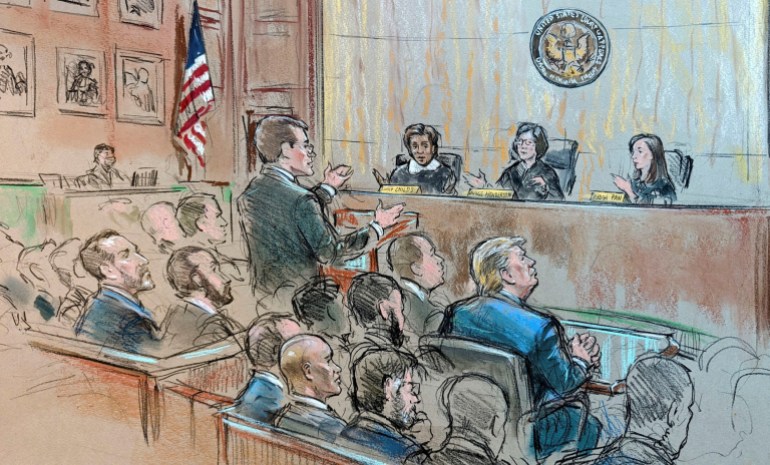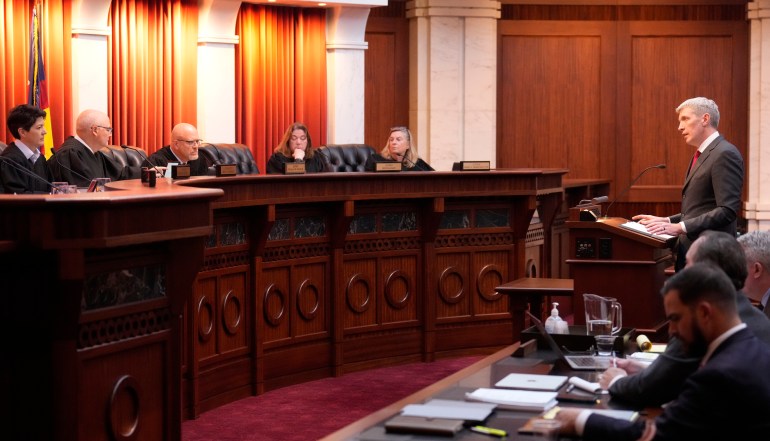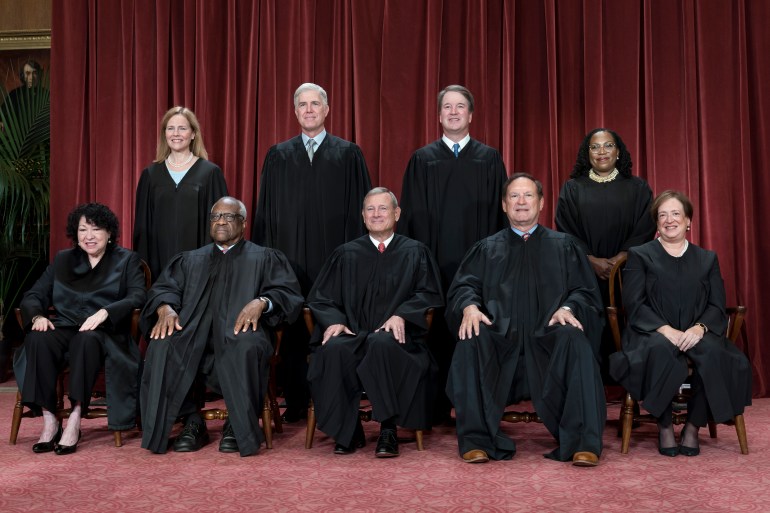
Los Angeles, California – As the United States presidential election begins, the Supreme Court is expected to hear several high-profile cases that could affect the election outcome.
But experts say this puts the court in a precarious position. With Republican frontrunner and former president Donald Trump involved in several court casesthe court may be forced to confront the limits of its impartiality.
Some justices may even have to publicly evaluate the behavior of the former president who nominated them for the office. Ultimately, Trump is credited with giving the court its current status conservative supermajorityafter Appointment of three judges during his term of office.
The Trump cases will be “a test of whether or not the court can somehow put aside their political preferences and biases,” said Michael Gerhardt, a law professor at the University of North Carolina at Chapel Hill.
Testing the limits of presidential immunity
One of the cases likely to be sent to the Supreme Court has to do with Trump far-reaching claims to immunity for the actions he took as president.
Federal prosecutors led by a special investigator Jack SmithTrump argued conspired to overthrow the 2020 election results during his final days in office. But Trump’s legal team has urged the court system to dismiss the charges on the premise that as president he is immune from criminal prosecution.
An appeals court heard arguments in the case this month. If Trump loses there, he will likely turn to the Supreme Court for another appeal.
Gerhardt said Trump’s immunity case will be a tough sell, although. “Trump’s immunity argument is incredibly weak. In fact, it’s just plain bad. And I find it hard to imagine any court agreeing with his argument.”
However, Gerhardt added that the Supreme Court may not take the case at all and that the federal appeals court’s decision would be the final word. “They’re probably not at all eager to get involved. The immunity case probably represents a great opportunity for the court to just stay out of it.”

“Insurrection clause” is written on the file
The Supreme Court has already been asked to intervene in another case involving whether states have the ability to do so Remove Trump from their area codes.
Colorado And Maine claim that Trump is ineligible to appear on their ballot because of his actions January 6, 2021as his supporters stormed the US Capitol to stop Congress from certifying the 2020 election results.
Both states cited the 14th Amendment of the U.S. Constitution, which contains a section that prohibits people from holding public office if they take an oath of allegiance and then support an insurrection.
Trump card has spoken to rioters before the 2021 attack on the Capitol, repeating false claims that the election was stolen and urging the crowd to “fight like hell.”
Experts told Al Jazeera that of all the cases the Supreme Court could take on in 2024, its decision on whether Trump can be removed from states’ ballots could have the biggest impact on the election.
The Supreme Court has never before ruled on the so-called “Insurrection Clause.” The states’ action also marks the first time in history that the clause has been used against a presidential candidate.
Trump’s lawyers, for their part, argued that it was unclear whether the law applied to the office of president and noted that Trump’s comments fell within the scope of free speech.

A likely victory for Trump
The court is scheduled to hear arguments in the case beginning Feb. 8, ahead of the March 5 primaries in Maine and Colorado. Each primary election decides which candidates are nominated by the main parties.
Mark Graber, a law professor at the University of Maryland School of Law, said the Supreme Court justices would want to wrap up the case quickly to avoid confusion among voters.
“They’ll probably speak up pretty quickly, in the sense that they’ll realize this is something that shouldn’t be left to the wayside,” Graber said of the judges.
“So far, he [Trump] There has not yet been a ballot started where there is a primary election that appears urgent.” The primary election season is scheduled to begin with a vote on January 23rd New Hampshire.
Barbara Perry, a professor of presidential studies at the University of Virginia, expects the conservative Supreme Court to ultimately rule in Trump’s favor.
“I think it’s very likely that they will do that,” she told Al Jazeera. “Typically, political scientists have generally found that judges tend to follow the ideology of the president who appoints them 70 to 80 percent of the time.”
Graber called the case “very challenging” for the court’s justices, particularly given their political leanings.
“Given the nature of the case, it will be very difficult to avoid the appearance of bias,” he said. “As with abortion, everyone believes their position is the neutral position, and anyone who decides otherwise is obviously biased.”

Bias on the bench
The question of judicial bias is a growing concern for the Supreme Court. In the past, the Supreme Court was viewed as a body above politics, answerable only to the law.
But this image is shattered when faced with the court Questions about credibility.
Public opinion of the Supreme Court has recently fallen to historic lows. In 2023, the Pew Research Center found this out only 44 percent of Americans received the court positively – it was the first time since 1987 that a majority of Americans expressed their disapproval.
Perry attributed the low approval ratings to this ethical mistakes and controversial decisions about abortion And positive action in the higher education sector.
One of the judges at the center of the court’s recent scandals is Clarence Thomasa conservative judge who was asked to recuse himself from Trump-related cases.
According to media reports in the US, his wife, activist Ginni Thomas, asked officials to do so rejects the 2020 election results, which showed Trump losing to Democrat Joe Biden. These reports also suggest that Thomas could benefit financially if Trump is re-elected.
But experts like Perry doubt Thomas will resign when faced with a crucial election issue.
“He doesn’t usually refuse,” Perry said, noting that much of the responsibility falls on judges over police their own ethics. “The judges have to make that decision.”

Looking for unity at court
But there is a lot at stake for the Supreme Court. The perception of bias during a closely contested election year could further undermine public trust in the judges whose rulings influence the interpretation of the law.
“That’s when the court is most at risk — when it’s seen as partisan and mired in the muck and quagmire of everyday politics,” Perry said.
This is what the experts who spoke to Al Jazeera pointed out Chief Justice John Roberts will likely seek a unanimous opinion from all nine justices in this year’s high-profile election cases to avoid public backlash.
“A unanimous opinion would mean, ‘Man, this isn’t politics.’ Everyone agrees with it.’ “On the other hand, the more you get an opinion that falls apart along political lines, the more people are likely to think it’s just politics,” Graber said.
Perry agreed: “The worst thing for the court would be if it goes six to three for Trump… That’s when it will be seen as the most partisan.”
The last time the Supreme Court played such a significant role in a presidential election was in 2000when it decided to stop a recount of votes in Florida, thereby declaring George W. Bush the winner of the race.
Although it is not uncommon to see the highest court weigh When it comes to an election, Graber said 2024 still signals a turning point in U.S. history.
“We are in a time where a lot of places that are thought to be established democracies are under threat. And many people think Donald Trump is a threat to democracy,” he said.
He also noted that the Supreme Court’s decisions are already having an impact on the upcoming election. “They weakened the Voting Rights Act, they allowed gerrymandering — so I think they weakened democracy in the United States in many ways.”
But Gerhardt, a professor at the University of North Carolina at Chapel Hill, predicted that no branch of the federal government would escape scrutiny this election year.
“Every institution is being challenged — the Supreme Court, Congress, of course the presidency,” he said. “I think we have to prepare for it and expect it to be a bumpy road.”





Recent Comments